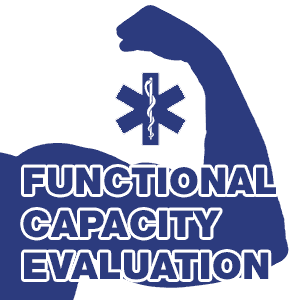
Did you know a functional capacity evaluation might sound scarier than it actually it is?
At different times in our lives we take physicals for school, sports, a job, or for just good preventive wellness. These exams were designed to evaluate our internal health and general wellbeing. Unfortunately, despite the name ‘physical’ there isn’t much ‘physical’ about these wellness exams.
A functional capacity evaluation in comparison, is a truer physical designed to review your physical external state, function and strength ability.
Yes, your blood pressure and vaccination records are an important part of your overall health and well-being, but they don’t say much about your knee condition or upper and lower body function and strength. These physical attributes may be more important for certain job positions than a vaccine or tuberculosis test. Hence why a function capacity evaluation was developed.
The first difference one may realize when starting this kind of evaluation is that there isn’t much sitting or lying down like in a regular wellness exam. The evaluation is conducted by a licensed physical therapist who will give the patient clear and precise instructions to perform certain physical tasks related to a defined job description.
A common example is the lift test. Pretend that a package delivery company requires their employees to carry boxes weighing up to 50 lbs. The physical therapist will have different objects weighing 50 lbs and record how the patient picks it up, walks with it, sets it down, and other movements relating to the job description while carrying the 50 pound box.
The goal here is not to prove the patient is strong enough, but that the patient has the strength, endurance, and knowledge to manage the weight. Just because the box was carried one time does not mean they are able to walk with it comfortably. Likewise, just because the box was picked-up, it does not mean it was done properly and safely.
As the physical tasks are preformed and evaluated, the physical therapist will also give advice and instructions on proper movement – e.g. – keep eyes up, bend from knees when lifting, lift with your legs, keep back straight, focus on where you are going and scan your working area at all times and more. This educational part of the evaluation is usually overlooked, but can actually be a major part of reducing future workplace injuries.
Once the functional capacity evaluation is complete and all tasks are recorded, the physical therapist will review the results and notes and make a professional assessment on the physical ability of the individual to safely perform the job description presented.
The assessment itself does not guarantee nor deny employment, but rather allows the employer and new hire to evaluate the job description and see if there are any changes that can be done to accommodate the person’s physical ability. It could mean different expectations, additional tools and support, a different position altogether, or if no options are reasonable, a reevaluation of the current job status may be required.
This entire process exists to help companies hire physically able employees who could perform the job required, but most importantly, makes sure that new hires are not put in a position to perform a job they are unable to perform while keeping themselves and anyone else they are assisting safe. Many workplace accidents can be prevented and a functional capacity evaluation is just another way to avoid placing individuals in positions where they are most likely to get hurt.
